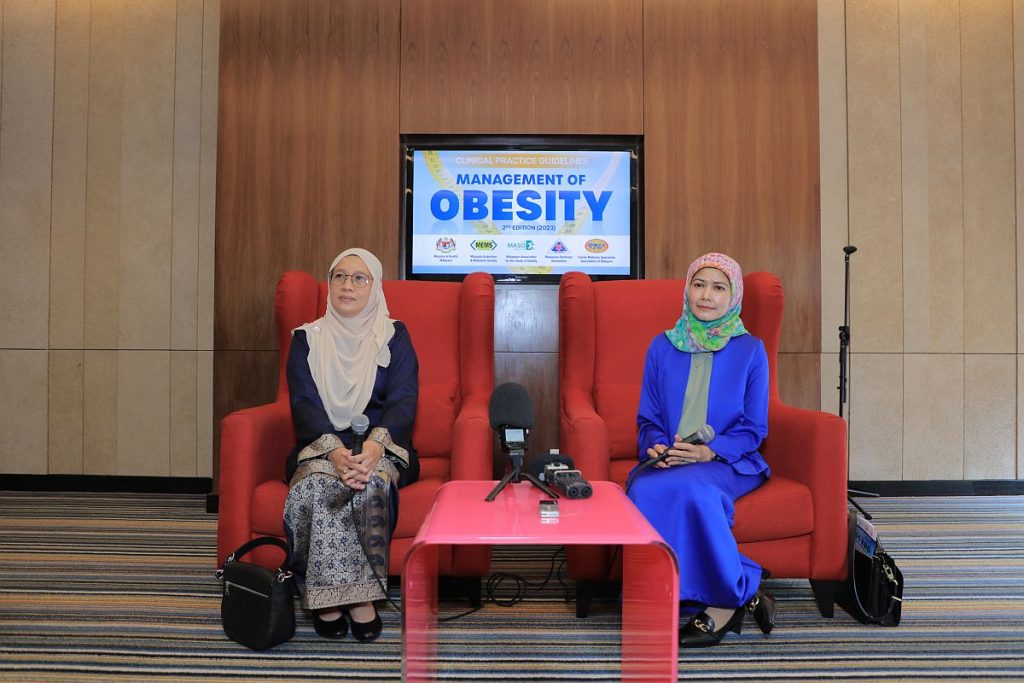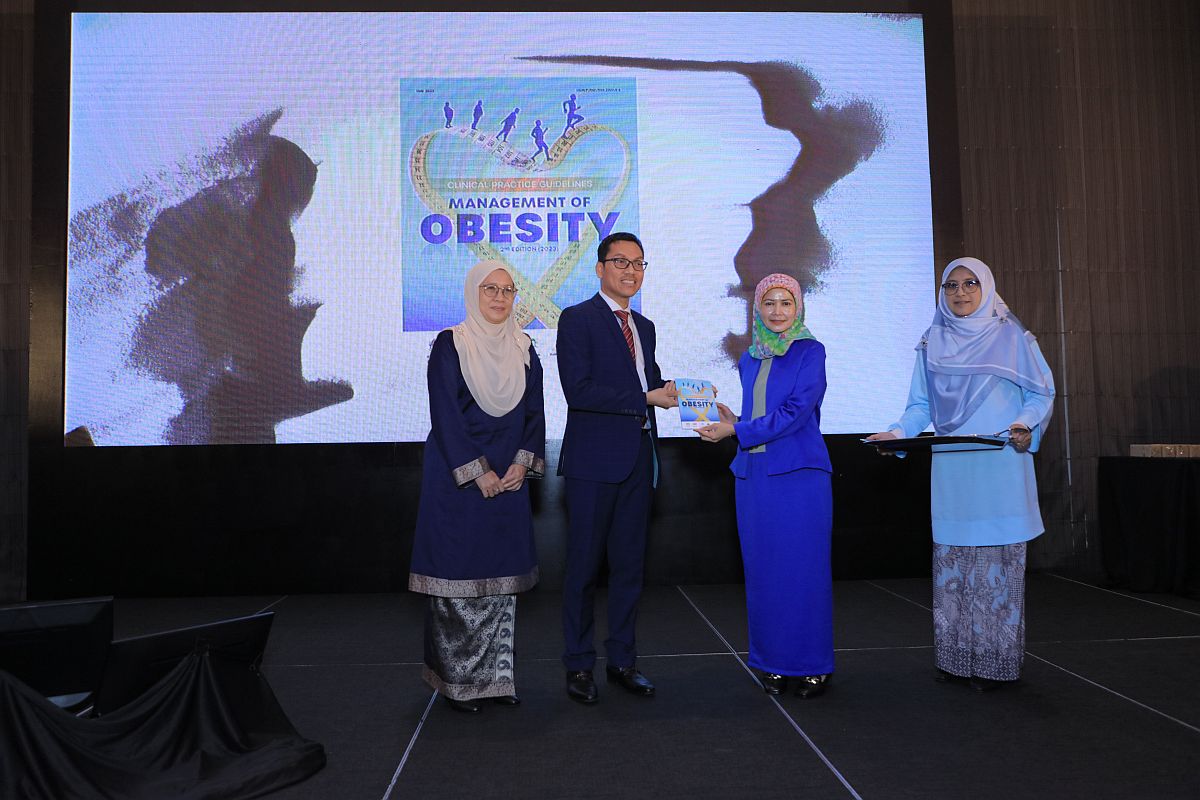KUALA LUMPUR, Dec 29 – The Ministry of Health (MOH) in June released new guidelines – the first update in nearly two decades – to evaluate and treat individuals, including adolescents and children, who are overweight or obese.
The guidance comes as the prevalence of overweight and obesity among adult Malaysians has increased nearly 10 percentage points in the past decade, rising from 44.5 per cent in 2011 to 50.1 per cent.
Even more alarming is the rise in childhood obesity, which has more than quadrupled from 6.1 per cent among Malaysian children aged 5 to 17 in 2011 to 29.8 per cent in 2020, according to the National Health and Morbidity Survey (NHMS) 2019.
The 119-page Clinical Practice Guidelines (CPG) for the Management of Obesity (Second Edition) is a joint publication by the MOH, the Malaysian Endocrine and Metabolic Society (MEMS), the Malaysian Society for the Study of Obesity (MASO), Malaysian Dietitians’ Association (MDA), and Family Medicine Specialists Association of Malaysia (FMSA).
The new guidelines emphasise that obesity is a complex and chronic condition without a simple fix. Behavioural and lifestyle changes should be the first-line approach, but the CPG also includes recommendations for anti-obesity medications and surgery, which should always be paired with a lifelong commitment to lifestyle changes.
Some of the key updates in the new guidelines are as follows:
1. Screening For Overweight And Obesity
All individuals attending the health care centres should be screened and identified for weight problems. The cutoff level used in this CPG in diagnosing overweight and obesity reflects the presence of body fat and the probability of associated diseases.
2. Focus On Lifestyle Changes
The most effective way to manage overweight and obesity is through lifestyle changes such as healthy eating, regular physical activity, and behaviour modification.
3. Individualised Treatment Plans
Treatment plans should be tailored to an individual’s needs, preferences, and goals. This includes considering factors such as age, gender, medical history, and cultural background.
4. Multidisciplinary Approach
Tackling overweight and obesity requires a team-based approach involving various health care professionals including dieticians, exercise specialists, psychologists, and physicians. Comprehensive care and support should also be given to persons with overweight and obesity.
5. Pharmacotherapy
Medications may be considered for individuals with BMI of 30 or higher, and BMI of 27 or higher with weight-related comorbidities. Pharmacotherapy should always be used in conjunction with lifestyle changes.
6. Bariatric Surgery
Bariatric surgery may be considered for individuals with BMI of 37.5 or higher, and BMI of 32.5 or higher with weight-related comorbidities. It is important to note that bariatric surgery is not a quick fix, as it requires a lifelong commitment to lifestyle changes.
7. Prevention
Prevention strategies such as early childhood interventions, promoting healthy school environments, and community-based programmes can reduce the prevalence of overweight and obesity.

Excess body weight has serious physical health consequences, including Type 2 diabetes, high blood pressure, coronary artery disease, and even cancer, said Dr Nurain Mohd Noor, president of the Malaysian Endocrine and Metabolic Society (MEMS).
“The disease burden is significant. Obesity accounts for 19.4 per cent of total health care spending, the highest rate among Asean countries. Additionally, the estimated productive years lost for males and females with obesity is substantial, standing at approximately 6-11 years and 7-12 years respectively,” Dr Nurain said during the release of the new guidelines.
Professor Dr Norlaila Mustafa, chairperson of the CPG Development Committee, highlighted the need to adopt newer, holistic, and multidisciplinary approaches to combat overweight and obesity.
“We drew on experts from diverse fields, such as endocrinology, psychology, dietetics, sports medicine, family medicine, and even paediatric endocrinology.
“Our combined efforts resulted in a comprehensive CPG incorporating many breakthroughs and advances that offer promising solutions, including psychological interventions, nutrition, types of exercises, pharmacotherapy, and bariatric surgery,” Dr Norlaila said.
The senior consultant endocrinologist revealed that cognitive behavioural therapy has shown effectiveness in helping individuals with obesity maintain lifestyle changes. Tools like the Binge Eating Scale help identify individuals with binge eating disorder, while “SMART” strategy aids in patients’ goal-setting and problem-solving techniques.
The Binge Eating Scale is a 16-item questionnaire completed by the patient that assesses the presence of certain binge eating behaviours which may be indicative of an eating disorder. It is formatted as groups of statements about behaviour, thought and emotional states.
The “SMART” tool, on the other hand, is the setting of specific, measurable, achievable, relevant, and time-bound (SMART) goals that can be adhered to as a form of behavioural and cognitive intervention.
Dr Norlaila added that dietary approaches that effectively reduce calorie intake and promote weight loss include low carbohydrate, low fat, isocaloric diets with varying carbohydrate levels, low glycaemic index/ glycaemic load diets and meal replacement.
“All these dietary prescriptions should be individualised to one’s motivation level, age, and weight loss goals,” she said.
In terms of physical activity, Dr Norlaila said that different types of exercise yield varying effects on weight loss and there are specific recommendations for the elderly population.
Physical activity recommendations for all individuals with obesity include a minimum of 150 minutes per week (30 minutes a day) progressing to 300 minutes per week (60 minutes a day) of moderate intensity.
For weight loss, at least 75 to 150 minutes per week of vigorous intensity is required. A combination of both moderate- and vigorous-intensity activity throughout the week should be encouraged to maintain weight loss.
Both resistance and aerobic exercise or activities should be emphasised to improve physical function and well-being.
As for pharmacotherapy, it can be initiated if a person is morbidly obese or when lifestyle changes fail, Dr Norlaila said. “Newly introduced drugs in the obesity guidelines such as naltrexone-bupropion combination, liraglutide and semaglutide were found to help reduce calorie intake by suppressing appetite,” she explained.
If pharmacotherapy fails, bariatric surgery such as the Roux-En-Y gastric bypass, sleeve gastrectomy and abdominal gastric banding procedures can be considered, Dr Norlaila said.
In the case of managing weight in children and adolescents, Dr Norlaila said the step or staged approach – which allows for a gradual decline in BMI with weight maintenance or a slower weight gain – takes into consideration factors such as age, degree of obesity, health risks, and patient motivation.
Treatment programmes should target decreasing overall dietary intake, Increasing physical activity, decreasing time spent in sedentary behaviour, and addressing sleep behaviour.
Children and adolescents may also benefit more from using mobile apps for tracking exercise and meal intake as well as family-focused lifestyle interventions.
“It is crucial to reduce the rate of obesity in Malaysia. Prevention of obesity entails adopting a healthy lifestyle. Improving physical activity, a well-balanced diet and guiding patients on the implementation of stress management practices should be offered to all,” Dr Norlaila said.
“Those who are at risk of developing obesity in normal-weight or overweight adults should also be offered weight management intervention. Making these a routine will help prevent obesity and improve overall health.”








